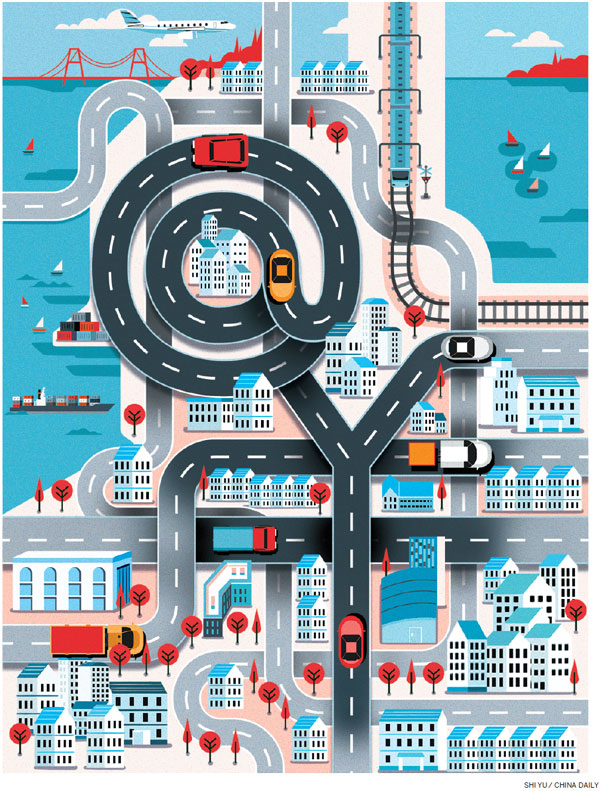Logistics hubs provide route to more growth


Greater efficiency in transporting goods will help reduce costs and enhance market vitality
China has decided to build a number of key hubs for the logistics sector and improve its efficiency and information-sharing as part of efforts to substantially reduce the ratio of overall logistics costs to GDP, and build a modern logistics system.
The decision was made at an executive meeting of the State Council, the Cabinet, which was presided over by Premier Li Keqiang on Wednesday.
Four measures were released in a statement after the meeting, including key hubs to be built in cities that have geographic and industry advantages, and the standardization of transfer, unloading and storage of goods.
Entities running such hubs will be supported in issuing bonds or going public. Meanwhile, the sector will further open up as private and foreign capital is welcome in the construction and working of the hubs.
The market is expected to play a bigger role in integrating existing facilities, such as logistics parks, to strengthen information sharing and more intensive use of such amenities.
New models, including supply-chain logistics, express delivery and e-commerce, will be boosted for the smart, green and highly efficient development of the sector.
Li said at the meeting that logistics costs should be lowered to stimulate market vitality and improve national competitiveness, and a clear target should be set in building logistics hubs to ensure a substantial decline in the ratio of logistics costs to GDP.
The government should increase input in railways and highways in the construction of logistics hubs, and the market should play the role it is designed for instead of being restricted by rigid planning, the premier said.
According to the China Federation of Logistics and Purchasing, the nation's overall logistics costs hit 131 trillion yuan ($18.9 trillion) in the first half of this year, an increase of 6.9 percent compared with the same period last year.
The average utilization rate for internet-enabled vehicles is 50 percent higher than those deployed by traditional transport companies, with the average waiting time for cargo being reduced by eight to nine hours. Average costs for internet-based vehicles were 6 to 8 percent lower than traditional ones.
These figures showed the advantages of emerging areas of the logistics sector.
Meanwhile, the number of express deliveries reached 22 billion in the first six months, up by 27.5 percent compared with the same period in 2017, according to the State Post Bureau. The rapid growth of express delivery also demonstrated the online shopping and demands a faster-response mechanism.
However, Liu Xiaonan, an inspector in the department of economy and trade at the National Development and Reform Commission, said at a national meeting on logistics innovation in April, that China's logistics industry was not strong with its high costs and low efficiency. He also said the industry is being challenged by information isolation while central and western China, and rural areas lag behind in logistics infrastructure.
Improvement of the logistics sector can play a vital role in promoting consumption, production and international trade, Liu Dacheng, deputy dean of the Internet Industry Research Institute at Tsinghua University, was quoted as saying by the newspaper Economic Information Daily. Smart logistics should be built to connect all stations and provide services that are more efficient, with lower costs and faster response, he said.
Wu Qi, a senior researcher at the public policy think tank Pangoal Institution, said developing a modern logistics system should balance efficiency and profit, and development and environmental protection, while integrating the roles of government and market.
A system for logistics hubs should be built to enhance standardization for the industry and break information isolation within the sector, which can help to make a green, smart and standardized industry, Wu said. It means all existing facilities should be integrated with each other to raise information sharing, he said.
In addition, the government should further administrative streamlining to make access easier, reduce costs for logistics companies and create a more inviting environment for domestic and foreign investments, Wu added.
- ?Typhoon Wipha pummels Guangdong province
- 'Pet' major launched as demand surges
- Typhoon Wipha makes second landfall in South China's Guangdong
- PLA honors 12 as 'most beautiful revolutionary soldiers' ahead of Army Day
- Six suspects arrested in kindergarten lead poisoning case
- China coastal regions brace for Typhoon Wipha





































